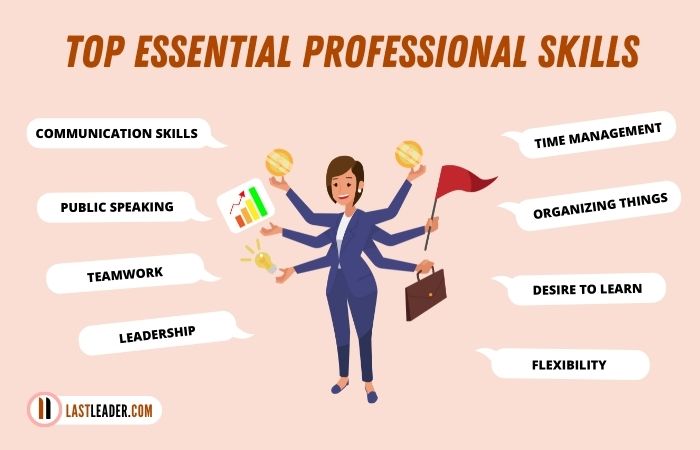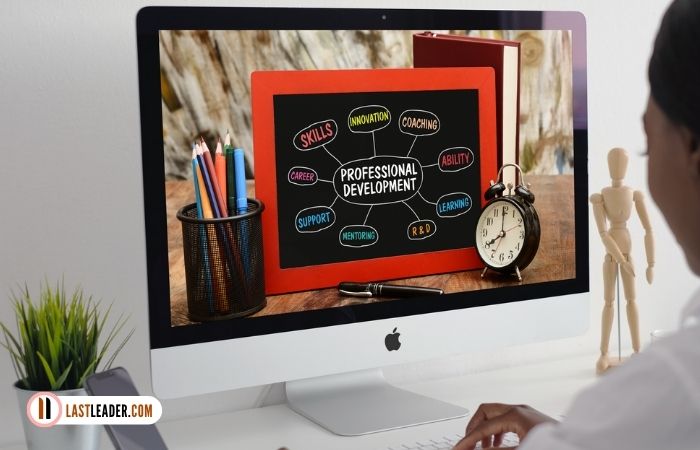What are the professional skills?
Professional skills are skills that will help you excel in your work. Professional skill is the behavior, personality characteristic, or skill that improves your work performance. Professional skills can help individuals in various job roles, fields, and workplaces.
Professional skills can also be described as soft skills. Soft skills define how we can relate to our surroundings and those around us. They refer to skills that can be easily transferable from one job to another. In contrast, hard skills are more specific, technical, or specialized skills relevant to a specific work or industry.
Professional skills examples
Examples of professional skills are active listening, public speaking, teamwork, collaboration, management, leadership, time management, emotional intelligence, integrity, self-confidence, self-motivation, problem-solving skills, etc. These are just a few professional skills examples.
Top Professional Skills to Develop
There are many professional skills to develop, but we describe some important out of them. To upskill your professional skills, surround yourself with the people who are masters in these skills.

1. Communication
Communication abilities, in general, are essential for every professional. It encompasses written, verbal as well as non-verbal communication. If you are a professional in the workplace, you must learn how to communicate with colleagues and your boss effectively. These skills not only aid in establishing business relationships but also make sure that you are aware of the tasks you’re required to finish if you’re a manager or a new employee.
Here are some examples of the communication skills that can assist you in your chosen field:
a. Thinking through ideas:
Being able to communicate effectively lets you participate in group discussions and develop innovative ideas to assist the business in general.
b. Requesting help or advice
Communication effectively allows you to seek assistance with a problem that you’re dealing with. The more precise and clear you convey your message, the easier it will be for others to comprehend the message you’re expressing and offer the assistance you require.
c. Active listening:
If you’re an active participant, it’s much easier to comprehend what someone is saying. For instance, if you’re in a meeting for business and are attentive to the speaker, make sure you are aware of the issues that were discussed and what is expected of you.
Other communication abilities include:
- Advocate for yourself and your cause
- Requesting help or advice
- Brainstorming
- The process of gaining buy-in for an idea
- Writing for business
- Working with difficult people
- Facilitating
- The handling of office politics
- Handshaking
- Information and Communications Technology (ICT)
- Interviewing
- Maintaining a positive relationship the employer
- Listening
- Networking
- Persuasion
- Writing resumes
- Small talk
- Social Skills
- Communication via words
- Written communication
2. Public speaking
Nearly every job requires public speaking. Professionals must communicate with other people clearly and professionally convey information. Although you may not be giving lengthy talks frequently, you will most likely have to speak out at meetings, present details to colleagues, or address the group in a limited manner.
The skills related to public speaking include:
- Confidence
- Poise
- Body language awareness
- Plan your key talking points or ideas ahead of time
- Leadership
- Reacting and thinking about rapid changes
- Clarity
- Increase the amount of voice
- Ideas for organizing
- Articulation
- Engaging with your audience, for example, using eye contact
- Altering vocal tone
- Be open to constructive feedback
- Concision
3. Teamwork
Every professional must be part of a group, regardless of whether they’re involved in group projects or helping an organization achieve its goal. As an employee, you need to be able to demonstrate the interpersonal abilities necessary to work with colleagues. You should share the burden with other people, effectively communicate and reach the same goal.
Below are some instances of how you can demonstrate teamwork:
- Team building: If you’re working on your project at work, teamwork abilities will help you build better interpersonal relationships with coworkers. Developing professional relationships with your team members helps make a positive work environment for everyone involved.
- Conflict resolution: Like any project involving a group, conflicts could arise when working as a team due to differences in opinions and personalities. Being a team player will allow you to handle conflicts when they arise and then resolve problems before they become a cause.
Other teamwork skills professionals require
- Collaboration
- Reliability
- Willingness to assist others
- Friendliness
- Respectfulness
- Tolerance
- In pursuit of the same objective
4. Time Management
In the professional skills list, time management is an integral part of a professional’s life. As an employee, you’ll be required to complete many tasks. You’ll need the skills of an organization to manage your time to meet each task on the deadline without feeling overwhelmed.
The concept of timeliness may sound simple, but it’s actually among the top essential characteristics of an experienced professional.
People who show up at the right time (or even earlier) are often thought to be more efficient by their bosses (even when this isn’t the reality). Therefore, you can enhance your professional image by arriving at meetings and working just a few minutes earlier.
- Attention to detail
- The motivation that is intrinsically based
- Meeting deadlines
- Management of projects
- Punctuality
- Self-starting
5. Leadership
Leadership is a must-have skill from the professional skills list. Whatever your position in a business, possessing leadership abilities can help you make you stand out. If you’re on an organization’s staff or in a managerial post, the ability to lead is a crucial capability for professionals. Leadership skills can assist you in managing, supervising, and encouraging your team. Here are a few examples of leadership qualities:
- Leadership as a leader, you have to make simple and challenging choices. Your decisions can result in positive or negative results; therefore, knowing the best way to approach situations you have to choose is crucial.
- Resilience
No matter what your job is within a business, the company’s employees need to be able to count on you. You need to be confident and punctual to get the job accomplished. As a supervisor, the team you manage must know that they can trust you to provide assistance and direction.
The skills that are associated with leadership include:
- Confidence
- People management
- Accountability
- Prioritization
- Skills for motivation
- Coaching
- Management of projects
- Analytical abilities
- Creativity
- Mentorship
- Ability to inspire others
- Goal setting
- Management of stress
- Politeness
6. Flexibility
The majority of jobs require some degree of flexibility and the ability to adapt. It is essential to see the world from different angles and alter your workflow and contribution to the business as the need for change occurs.
When you’re flexible, it means you’re more able to handle unexpected changes to your schedule. If you can handle changes, you can motivate others to be the same. Here are a few examples of the flexibility skills you can develop:
- Patience: This is the ability to tolerate or accept certain situations that come up. If you are working with others, being patient can assist you in reducing conflicts and help you achieve your long-term goals. It also assists in establishing more professional relationships in the workplace.
- Flexibility: In the event of a crisis and you face challenges, you must be able to adjust your schedule following the needs of the business at the moment. Being flexible not only helps you stay calm during stressful times but can also demonstrate to employers that you’re prepared to leave your schedule as it was to address any new issues.
Here are a few capabilities that can allow employers to see that you’re flexibly needed to succeed at work:
- Remaining calm and composed in stressful situations
- Adaptability
- Open-mindedness
- A positive approach to challenges the mental attitude
- Proactiveness
- Critical thinking
- Patience
- Willingness to take into consideration any additional information or alter your mind
- Perceptiveness
7. Personal Skills
In the list of professional skills to develop, some personal skills also come into account. Personal skills are soft skills that allow employees to interact well with managers, other employees, customers, clients, vendors, and others they interact with. These abilities and skills are essential to be successful in professional networking and manage your professional development.
Here are some other personal qualities:
- Organizational Skills: These skills can help you stay focused in completing deadlines and maintain track of your tasks and resources. Being organized will also aid in time management.
- Management of time: Managing your time is about controlling the amount of time you dedicate to specific tasks. If you can control your time effectively and effectively, you’ll be able to find a balance between your work and personal life. To help you manage your time, establish goals, make a plan, create to-do lists, and employ other tools to help maximize your working day.
- Stress management: While stress is commonplace in working environments, controlling it properly will help prevent issues for you and your workplace. A few strategies for managing stress include exercising, eating healthy, and maintaining an optimistic attitude.
8. Career Management
- Career plan
- Competency
- Thinking creatively
- Critical thinking
- Emotional intelligence
- Enforcing boundaries (personal, professional)
- Ethics
- Honesty
- Humility
- Integrity
- Patience
- Perceptiveness
- Perseverance
- Persistence
- Practicality
- Resilience
- Respect
- Self-awareness
- Self-confidence
- Self-management
- Self-promotion
- Self-regulation
- Management of stress
9. Emotional intelligence
Emotional intelligence refers to how we express our emotions and relate to others and interpret other people’s behavior. People with emotional intelligence can detect how others feel through their words, actions or behaviors. Emotional intelligence can benefit professionals in various social situations, whether dealing with coworkers, clients, or supervisors. If you’re an emotionally intelligent person, you can also recognize the signs of emotional intelligence assessment and evaluate your own emotions.
Here are some of the skills you can learn if you wish to develop your emotional intelligence
- Self-awareness
- Empathy
- Initiative
- Consciousness, or the ability and desire to treat others with respect
- Self-regulation
- Credibility
- Sympathy
10. Desire to Learn
Learning is a process that requires openness.
People eager to learn new knowledge and abilities are likely to get more interest by hiring managers. Most jobs, industries, or businesses change in time, and employers look for applicants who are open to learning new ideas, skills, capabilities, or procedures.
To demonstrate your desire to learn, you should focus on developing these skills:
- Acceptance of constructive criticism
- Enthusiasm
- The willingness to grow personally
- Initiative
- The ability to learn agility is the ability to learn new abilities
- Self-motivation
- Continuous engagement with local, industry, and global news, or any other
11. Integrity
Integrity refers to being trustworthy, honest, and possessing solid ethics or values. If an employer chooses to hire an employee with integrity, they believe in that person and trust that the new employee will live up to the company’s ideals. Integrity also implies the willingness to accept responsibility for your actions and actions.
Integrity-related skills include:
- Principled
- Honesty
- Credibility
- Understanding of ethics
- Loyalty
- Reliability
12. Self-confidence
Confident professionals are confident in their ability to perform their tasks effectively. If you are confident in yourself, you convey positive thoughts about your abilities to other people. Confidence in yourself can convince potential employers of your ability to fulfill your job duties.
If you’re looking to build confidence in yourself, focus on these areas:
- Courage
- Self-awareness
- Describing your talents to other people
- Tenacity
- Being assertive
- Optimism
- Determination
- Self-reliance
- Assessing and understanding your capabilities
13. Open-mindedness
People who have an open mind are open to new ideas, methods, techniques, and ideas. They can also accept, respect, and learn from each other. Most employers prefer workers who can effectively communicate with those who have diverse perspectives or have different backgrounds.
To become more open-minded, you can try to develop these competencies:
- Inquisitiveness
- The consideration of other people
- Introspection is the ability to analyze the thoughts of your mind and feelings
- Empathy
- Actively paying attention
- Desire to learn new experiences
- Positive thoughts
14. Professionalism
Professionalism is the term used to describe skills and actions respectful of other people. A professional employee displays kindness to others, takes on their responsibility, and proves trustworthy.
Skills for professional development could include:
- Reliability
- Kindness
- Poise
- Civility
- Respectfulness
- Accountability
- Mature
- Communication
15. Positive attitude
Professionals who have positive attitudes exhibit optimism, enthusiasm, and motivation. Positive attitudes will help improve other people’s moods, communicate better and boost the level of satisfaction you have at work. Many managers favor hiring workers who bring enthusiasm and enthusiasm to work.
Characteristics and skills associated with having a positive outlook include:
- Optimism
- Enthusiasm
- Passion
- Cheerfulness
- Find alternatives to solve the problem
- Friendly
- Self-confidence
- Active
- Positive thoughts
- Receptive to feedback
16. Organizing Things
The ability to organize helps you complete assignments and tasks. People who are organized know the importance of prioritizing tasks and design strategies and then implementing them. The ability of a person to manage their time is directly related to their organizational skills, as numerous employers need their projects that are completed on time and within their deadlines.
Achieving organizational proficiency means professionals excel in:
- Management of stress
- Plan creation
- Delegation
- Attention to details
- Punctuality
- Executive function, for example, assigning tasks
- Time management
- Resource distribution
- Dependability
17. Self-motivation
Self-motivated professionals tend to take the initiative. You usually require little supervision to begin or finish your tasks if you’re self-motivated. Supervisors are often impressed by those who complete their tasks and are committed regardless of the level of supervision they receive.
If you want to improve your self-motivation skills, you should consider acquiring these abilities:
- Self-starter
- Independence
- Ambition to reach
- Resilience
- Engagement to achieve the goals
- Optimism
- Initiative
- Ambition
- Willingness to expand and to change
18. Problem-solving
Many workplaces are characterized by uncertainty. Employers often choose to employ individuals who can react quickly to challenging or new situations. Problem-solving skills allow professionals to evaluate the situation and develop effective strategies and develop alternatives to solve the problem.
The skills related to problem-solving include:
- Risk management is the ability to assess the risk of various plans
- Innovation
- Determination
- Remaining calm during stressful situations
- Analysis
- Creativity
- Data understanding
- Decision-making
- Research skills
Why is professional skills development necessary?
Whatever your profession, it is essential to possess the right professional skills that will help you succeed in your interview. Not only will these skills aid you in impressing the hiring manager, but they could also assist you in becoming an individual professional in your field of choice. If you are aware of the skills that professionals need for better growth opportunities, The better prepared you will be to achieve success in your chosen field. This article discussed the importance of having professional skills at work and what qualifications are most beneficial to possess.
Tips for professional skills development

Here are some tips about how to learn and develop your professional skills:
1. Observe other professionals
Observation is the main part of professional skills development. Pay attention to how team members such as supervisors, distributors, supervisors, and other employees behave in their workplaces. Be aware of how professionals you work with communicate with one another as they complete their work and manage work processes. If you meet a colleague with a soft talent you’d like to learn, attempt to model how they conduct themselves or their behavior.
2. Attend workshops and conferences
Workshops, conventions, and related events offer you the chance to test your skills as a professional outside of the work environment. Make sure you are communicating effectively and listening attentively and other soft abilities while connecting with fellow professionals.
Conferences, lectures, workshops, and other professional events often select soft skills as their topics. For instance, you might encounter a webinar discussing the importance of self-confidence when working. Finding events similar to these can help further build your professional capabilities.
Learning is an essential part of professional skills development. Those who will not learn will not go too far in their career or business.
3. Solve workplace conflicts
Even though you might conflict with your colleagues, try to work together to resolve these disagreements. Team members and managers alike typically prefer to cooperate with an employee they believe will work while strategizing and communicating clearly but clearly in challenging situations. Consider the challenges as an opportunity to discover what you could be doing to help you understand how your colleagues can collaborate effectively, resolve problems, and function as a group.
4. Ask questions
Ask people more questions during interactions. It is possible to ask people questions regarding the topic even if you already know much about it or hold a different view. People who are more likely to ask questions rather than arguing or expressing their views may be successful in many soft skills, including the ability to communicate, being open-minded, or being willing to be a student.
Asking questions will provide insights into different perspectives or aspects of the field. If you decide later on time to discuss or provide your own opinions about the topic, You’ll be able to provide an additional, more thorough view. This helps in professional skills development.
5. Be open to feedback
Try to be flexible to feedback constructively. Many desirable professional abilities are related to hearing, assessing, and applying another’s opinion of their performance or work. Even if you disagree with the assessment, think about the other person’s comments in the past before dismissing or fighting.
Reviewing the feedback others provide to you as objectively as is possible will allow you to figure out how you can rationally debate the feedback and decide which aspects of it you can incorporate into your routine.
6. Build positive connections
Build positive relationships with colleagues and managers, clients, and other professionals you interact with. You might have better have friendly and cooperative interactions if you have good relationships at work. Professional skills are a broad range of behaviors, habits, and methods of communication when you interact with other people.
You could, for instance, take the initiative to have honest conversations with your coworkers and customers. You can ask about their plans for the weekend or hobbies, pets, and other subjects relevant to the workplace, which could give you a glimpse into their lives. You could also talk about your interests and plans, which can help them feel more comfortable speaking about their own lives.
7. Practice self-care
The process of learning new skills is easier if you’re already taking care of your fundamental requirements. Make sure you take care of yourself, for example, by eating healthy food items and spending time with loved ones, getting enough rest, and scheduling activities that you like. A healthy body and mind will help you learn and adjust to new routines.





